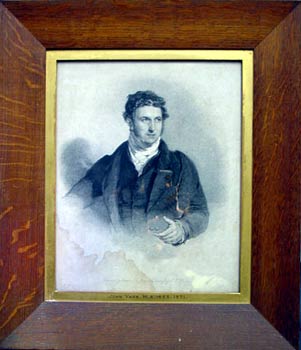 |
Wrington ARCHIVE Personal Quest - Who was John Vane's father ? |
 |
 |
Wrington ARCHIVE Personal Quest - Who was John Vane's father ? |
 |
|
|||||||||||||||||||||||||||||||||||
 |
|||||||||||||||||||||||||||||||||||
| The Rev John Vane, whose likeness hangs in the vestry alongside those of other past rectors of All Saints', was incumbent from 1828 to 1870. In late September, 2004, Neil Jackson, a researcher living in Bath, contacted the website with an intriguing query. Below the resulting correspondence is reproduced, and anyone able to add any information is warmly invited to e-mail web@wrington.info [As you will see, this correspondence grows considerably, and was referred to in an article by John Gowar in the February 2006 issue of the Village Journal - Ed] |
|||||||||||||||||||||||||||||||||||
| Bath - 29th September, 2004 I wonder if you could help me at all? I am trying to research the origins of one Reverend John Vane, mentioned here on one of your pages: http://www.wringtonsomerset.org.uk/history/villagerecords/page65.html I have also found a record for him at the Somerset Archive : http://www.somerset.gov.uk/archives/dservea/ (Ref No DD\BR\lch/14) regarding a house in Bridgwater, which states "Probate of will of the Rev. John Vane, rector of Wrington and Burrington, 1870, proved 1871 (natural son of 1st Duke of Cleveland, Chaplain in Ordinary to William IV and Queen Victoria)." Because the 4th Duke died without issue, and the family was technically 'extinct', stupendously vast areas of land were broken up for sale, or split between a number of 'lesser' family heirs. Although it seems John Vane died in 1870 or thereabouts and the 4th Duke survived until 1891, if John's family (assuming he had one) had proven their right to inherit, they would've stood to gain pretty much all of Bathwick, Wrington, Battle Abbey, Raby Castle, Barnard Castle, and parts of Bedale, Northallerton, Smeaton, Darlington, and hundreds of other parcels of land around this country and America. I'd love to know more about this man and his history! ~ ~ ~ ~ ~ Thank you for your most interesting inquiry. Yes, I'm sure they are one and the same. If you click on the All Saints' icon on the village website Homepage, and then on the 'past rectors' icon, you will see his likeness which hangs, as do all the others shown, in the vestry (where I photographed them !). |
|||||||||||||||||||||||||||||||||||